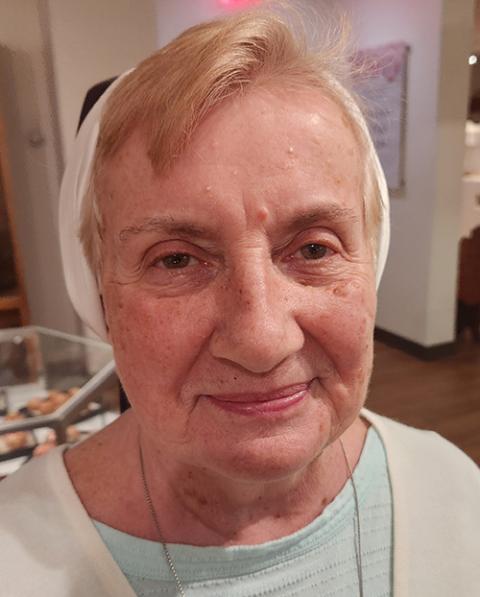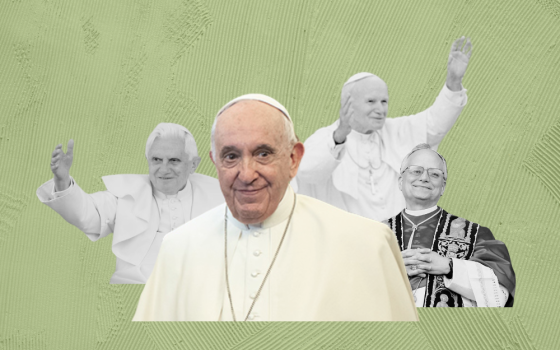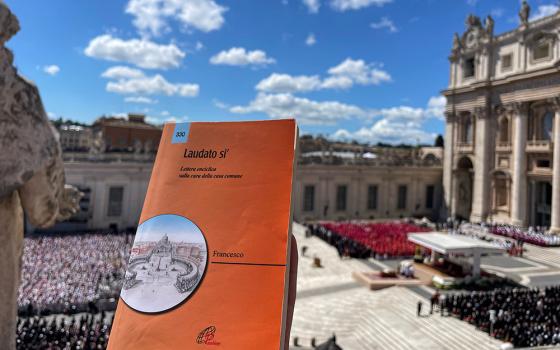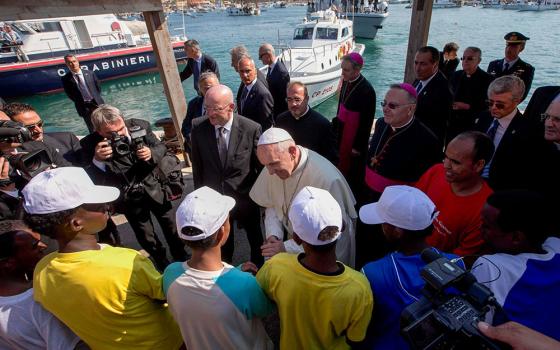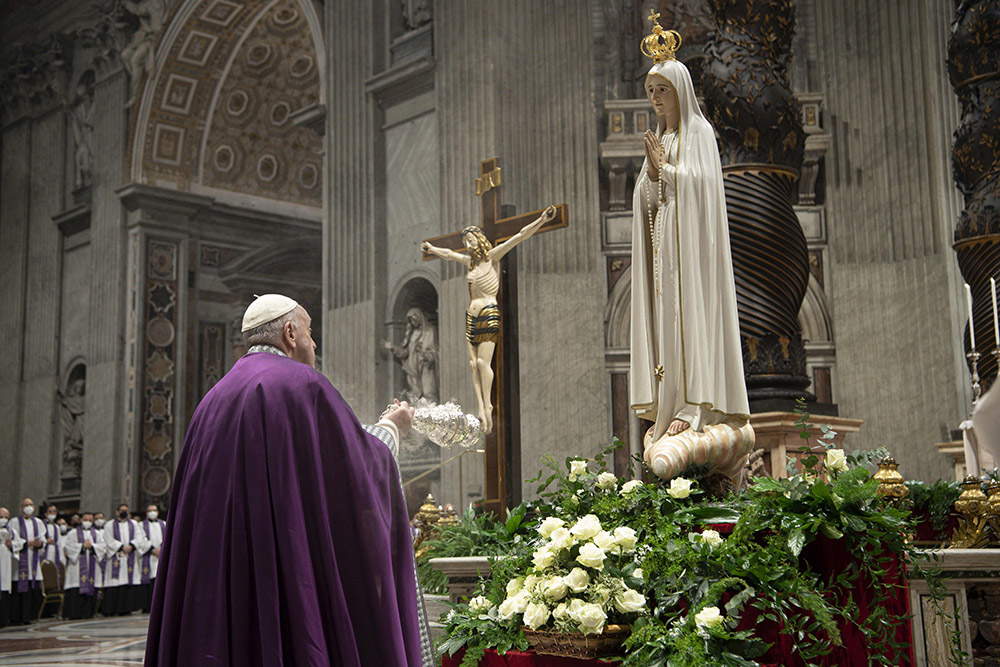
Pope Francis burns incense in front of a Marian statue after consecrating the world, and in particular Ukraine and Russia, to the Immaculate Heart of Mary during a Lenten penance service in St. Peter's Basilica at the Vatican March 25, 2022. A year later, he asked Catholics worldwide to renew the consecration and pray for peace. Pope Francis, formerly Argentine Cardinal Jorge Mario Bergoglio, died April 21, 2025, at age 88. (CNS/Vatican Media)
While hiding in a bomb shelter in the Ukrainian capital of Kyiv, Sr. Olga Shapoval reflected on the death of Pope Francis.
"In my heart, a sudden desire arose to ask him for protection, as I am sure that from the home of the Heavenly Father, he can help bring about a just peace in Ukraine, perhaps even more effectively than when he was among us," Shapoval told Global Sisters Report in an email following a sleepless night of missile attacks on Kyiv and other Ukrainian cities April 24.
Those initial thoughts suggested the complex feelings Ukrainians and Ukrainian Americans felt toward Francis since the onset of Russia's full-scale invasion of Ukraine in 2022.
No one doubted the pontiff's commitment to a peaceful solution in Ukraine and the end of violence there. But some felt that Francis did not fully appreciate the Ukrainian context and Ukrainians' experience of Russian aggression, which many describe as an act of genocide.
Even among Ukraine's small Catholic community, some felt that Francis was not robust enough in his condemnation of Russia.
"Obviously, when deadly missiles fly over your head, it is difficult to understand and accept some of Pope Francis's words and gestures." said Shapoval, a sister of the Order of Virgins in the Diocese of Kyiv-Zhytomyr, Ukraine. "Ukrainians, to some extent, felt disappointed in him."
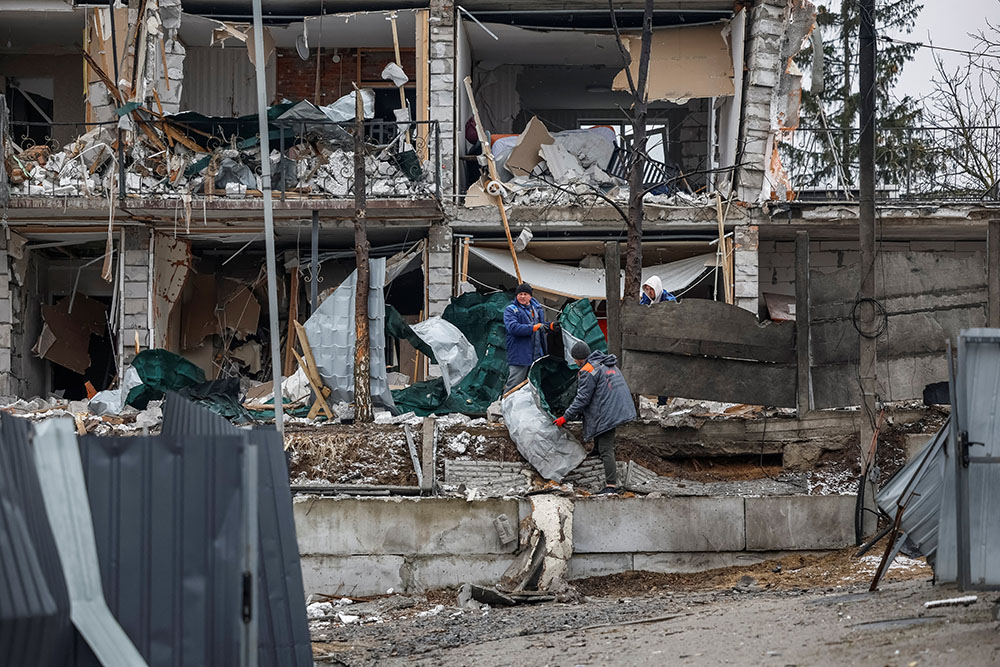
Men clear rubble near destroyed homes in the town of Hostomel in Ukraine's Kyiv region March 19, 2025, at the site of a Russian drone strike. (OSV News/Reuters/Alina Smutko)
Recalling April 2022, she said she felt "disappointment and pain when [at the pope's suggestion], during the Stations of the Cross, two women, one Ukrainian and one Russian, were supposed to carry the procession cross together."
That was objectionable to many Ukrainians because "it seemed to equate the experiences of the victim and the aggressor," Shapoval said. "It was the beginning of the war and Russia was actively invading Ukraine and committing serious atrocities. I understand that the intent may have been to promote reconciliation, but it's hard to speak about reconciliation when you are under constant bombing."
"Russia needs to stop the aggression first," she said. "That's why a lot of Ukrainians felt uneasy about that gesture."
Yet that memory is tempered by a belief that Francis "never forgot Ukraine, and constantly called on the world to pray for Ukraine. He contributed to the release of many of our prisoners, as well as the return of Ukrainian children abducted by the Russians and sent humanitarian missions." (Russian President Vladimir Putin and his commissioner for children's rights are under indictment by the International Criminal Court for forced deportations of Ukrainian children.)
"I believe that the Pope truly sincerely longed for peace and loved Ukraine," Shapoval said.
'Obviously, when deadly missiles fly over your head, it is difficult to understand and accept some of Pope Francis's words and gestures. Ukrainians, to some extent, felt disappointed in him.'
And beyond Francis' relations to Ukraine, Shapoval and others recall Francis' pastoral touch — what Shapoval called "the warmth and love with which he listened to, embraced and accepted people. He constantly had in his heart the most vulnerable and rejected."
Sr. Dorothy Ann Busowski, a member of the Order of St. Basil the Great and the house superior at the order's motherhouse in suburban Philadelphia, said that in a world "filled with many contradictory messages and seeming loss of hope," Pope Francis "stood out as a standard bearer of hope and decency."
"He, as our founder St. Basil the Great, urged us to leave things better than we found them. And he did. In him we saw a gentle person — one who embraced the incarcerated; who did not judge those who questioned their sexuality; who commiserated with the homeless; and those suffering from various [international] conflicts."
Sr. Ann Laszok, another member of the Order of St. Basil the Great who serves on the board of trustees at Manor College, a Pennsylvania institution founded by her province, expressed a similar view of the late pontiff.
She said Francis "captured my heart" after being named pope in March 2013, and he declared to the faithful at St. Peter's Square that they should pray for him because he was a sinner.
"It felt like the Holy Spirit refreshed the air in the room with this unprecedented Vatican humility — only possibly rivaled by St. Pope John XXIII."
Laszok was impressed that the new pontiff had personal connections with the hierarchy of the Ukrainian Catholic Church — and her appreciation grew further with his "emphasis on mercy for all, peace in a war-torn materialistic world, love for the poor, care for the Earth and the overall emphasis on the Gospel."
As for Russia's invasion of Ukraine, she cited a quote from Fr. Cyril Hovorun, a Ukrainian Orthodox theologian, who said in a recent interview with Euromaidan Press: "Ukrainians were not particularly happy about Pope Francis not naming the perpetrator, but at the same time, I believe he was on the Ukrainian side. He was on the right side of history. He was undoubtedly pro-Ukrainian, even though he was not always explicitly pro-Ukraine in the way that we would want him to be."
Still, Laszok praised the pontiff's "many efforts to end the war in Ukraine." Francis "made constant calls for the establishment of a just peace and prayed for the 'martyr' Ukrainian people. He was ready to help in various difficult situations, especially in regards to our kidnapped children," she said.
Advertisement
"Pope Francis was a reflection of the prodigal son's father — all embracing and merciful who worked tirelessly for the care of people and the Earth."
While not addressing issues directly related to Ukraine, Jonathan Peri, the president of Manor College, spoke similarly, saying in an email: "Pope Francis taught us many things, not the least of which is that our service in the image of God is one where we not only give of ourselves for others, but that we stand, even in the face of local and global pressures, against injustices and evils where others fear to do so."
Ukrainians and those affiliated with Ukrainian-American institutions were not the only ones with ties to Europe who praised the late pontiff.
"Pope Francis has inscribed an indelible and bright mark in the history of the church," said Sr. Krista Mijatović, a Sister of Mercy of the Holy Cross and secretary of the Croatian Conference of Religious, based in Zagrab, Croatia.
"He has left us a lasting example and profound inspiration of how to love the church, how to serve the church, and how to live for the church," she told Global Sisters Report. "He fully embodied the words of St. Ignatius of Loyola: Sentire cum Ecclesia — 'To think and feel with the church.' "

